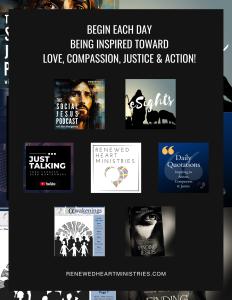
As we wrap up our look at our reading from the gospel of John this week, there are a couple things in our reading that I think the Johannine gospel gets right. First is the concern for unity. I don’t mean unity at any price, though. At the time of this gospel’s writing, the early church was in jeopardy of splintering apart with conflicts over power and control and different definitions of what it meant to follow Jesus. Various Jesus communities, some more egalitarian and others more patriarchal were in conflict. Communities that recognized the apostleship of Peter, Mary, Thomas, John, and the other apostles found themselves having to justify their validity in a larger community where some defined themselves as the only true Jesus-following group and sought to delegitimize the others. It is in this context that we read Jesus’ farewell prayer that his followers “may be one” as he and the Father were one. The gospel of John was calling for a richly diverse but still unified Jesus community as opposed to one defined by oneness as “sameness.” It’s ironic given that Christianity today is an internally diverse and divided religion. But diversity doesn’t have to mean division. And unity doesn’t have to mean homogeneity.
Welcome Readers! Please subscribe to Social Jesus Here.
(Read this series from the beginning at Part 1 and Part 2.)
We can learn a lot from the John here. Today some in our larger society are holding on to a past era in American history where power and privilege were based on the sameness of being white, male, straight, and cisgender. Those holding on to this way of shaping the world are deeply opposed to the life-giving, diverse, multicultural, multiracial, egalitarian, radical form of democracy where power is genuinely shared and everyone has what they need to feel safe and to thrive regardless of race, gender, orientation, and gender identity. Many Christians are among those who are obstructing this more diverse way of shaping our world. Yet when we apply the principle held by the Johannine community to our world today, we remember that our diversity is something beautifully rich, something to be celebrated and embraced. John’s gospel reminds us that although we may be different, we belong to each other. What affects one affects us all. And we either thrive together or decline and wither together. Humanity is far from homogeneous, but we are all still part of each other. Like it or not, our shared humanity connects us all.
Another life-giving value we can glean from this week’s reading as Jesus followers is found in the next-to-last sentence of this week’s passage, “As you sent me into the world, I have sent them into the world.” The gospel has already used a phrase like this: “For God did not send his Son into the world to condemn the world, but to save the world through him.” Are we to be sent into the world in the same way?
I’m reminded of both the writing of Delores Williams and the gospel of Luke here. Notice how Williams defines what it meant for Jesus to save the world: not from a post mortem hell, but from a hell many are enduring right now:
“Redemption had to do with God, through the ministerial vision, giving humankind the ethical thought and practice upon which to build positive, productive quality of life. Hence, the kingdom of God theme in the ministerial vision of Jesus does not point to death; it is not something one has to die to reach. Rather, the kingdom of God is a metaphor of hope God gives those attempting to right the relations between self and self, between self and others, between self and God as prescribed in the sermon on the mount, in the golden rule and in the commandment to show love above all else. (Delores S. Williams, Sisters in the Wilderness: The Challenge of Womanist God-Talk, pp. 146-147)
The gospel of Luke also defines Jesus’ saving work this same way, as concerned with the very real concrete and material realities that those around him were suffering at that time:
“The Spirit of the Lord is on me,
because he has anointed me
to proclaim good news to the poor.
He has sent me to proclaim freedom for the prisoners
and recovery of sight for the blind,
to set the oppressed free,
to proclaim the year of the Lord’s favor.” (Luke 4:18-19)
As we look around us at our larger world today, what does it mean for us to be sent the same way Jesus was? To be sent in the same life-giving, healing way we see demonstrated in Mark, Matthew, Luke, and John? To be sent as a source of love, compassion, justice, and safety for all, but especially for those presently striving to endure systemic harm?
Are you receiving all of RHM’s free resources each week?
Begin each day being inspired toward love, compassion, justice and action. Free.
Sign-Up Link in the comments below:
https://renewedheartministries.com/Contact-forms/?form=EmailSignUp















